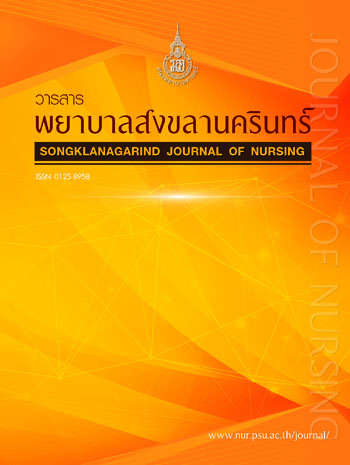Ethical Environmental Management for Reducing Global Warming Experienced by Head Nurses in Tertiary Hospitals, Southern Thailand
Main Article Content
Abstract
The descriptive research aimed to study (1) head nurses’ environmental management for reducing global warming, and (2) the principles related to ethics used by head nurses in environmental management.The participants consisted of 51 head nurses, selected by snowball sampling technique. The questionnaire was Semi-structure open-ended questions on the Ethical Environmental Management for Reducing Global Warming. Data were analyzed by using content analysis.
The results showed the head nurses’ environmental management using PDCA as follows: in planning step (P), the themes consisted of (1) collaboration in planning for correct waste segregation, reducing global warming, human safety, more income (100%), (2) 5s zoning towards quality environment and work improvement (100%), and (3) planning for medical equipment maintenance to extend its lifetime and reduce energy consumption (82.4%). For doing step (D), important themes comprised (1) cultivating environmental awareness for all (100%), (2) seeking opportunities to increase personnel’s knowledge and experiences related to the environment (100%), and (3) performing functions that are environmentally friendly (100%). Themes for checking step (C) included: (1) random checking, and observing (66.7%), (2) appreciation and giving rewards for successful task to sustain participation (66.7%), and (3) rounds, monitoring, advice to remind and instill right concept on environment (45.1%). The acting step (A) consisted of: (1) changing the working
pattern to reduce using resources (17.6%), (2) adjusting head nurse’s role to close supervision (3.9%), and (3) improvement of work to be systematic (3.9%).
The principles related to ethics used by head nurses in environmental management for reducing global warming included: (1) saving, cost-effectiveness, and the best interest (47.1%), (2) adequacy, middle way, based on principle of sufficiency economy (29.4%) and, (3) love, mercy and the benefit for mankind both at present and in the next generation (21.6%) The result of this study can be used by nurse administrators for environmental management in the workplace which will result in reducing global warming.


